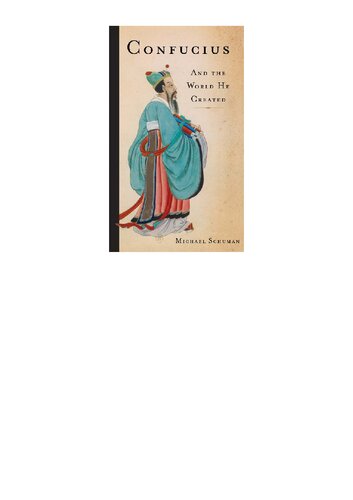
Confucius
And the World He Created
کتاب های مرتبط
- اطلاعات
- نقد و بررسی
- دیدگاه کاربران
نقد و بررسی

January 5, 2015
Part biography, part history, and part analysis of Chinese current affairs, this remarkable book from Schuman (The Miracle: The Epic Story of Asia’s Quest for Wealth), a Hong Kong–based correspondent for Time, traces the lasting influence of Confucianism in China, despite enormous political and social changes in Chinese society. Though little is known about the life of Confucius (ca. 551–479 BCE), we have his teachings, The Analects, a collection of his sayings gathered and edited by his disciples more than 200 years after his death. At the heart of Confucianism lies a well-regulated hierarchy in which each party—ruler and servant, parent and child, elder and younger—plays a specific role in honoring the other in the relationship. As Schuman points out, the philosophy that provided order in Chinese culture found itself threatened in the 18th century by foreign governments and technologies, as Chinese rulers sought to find a more politically savvy way to succeed in world affairs. By the 19th century, Chinese leaders embraced of Confucianism as an ethical system that produced leaders who would work for the common good. Schuman also explores how Confucian teachings continue to influence family life, education, and gender roles, optimistically concluding that it can offer an alternative to autocratic suppression. Agent: Michelle Tessler, Tessler Literary Agency.

December 15, 2014
A determined yet not exactly fresh look at this "hopelessly authoritarian, misogynistic, and conservative" sage, whose ideas have nonetheless endured and thrived in East Asia.Time journalist Schuman (The Miracle: The Epic Story of Asia's Quest for Wealth, 2009) finds plenty of intriguing contradictions in the ideas of Confucius (551-479 B.C.), which were largely spread by his ardent followers in the fragmented Analects and other works. The primacy of education, the uses of meritocracy, the sanctity of the filial bond, the subservience of women, the harmonizing sense of knowing one's place in society-these are some of the salient Confucian tenets. Schuman is not a scholar, and while he infuses his work with historical research, he remains rooted in the present day, seeking clues as to why Confucian ideas were both excoriated by the Chinese (during Mao Zedong's era) and rehabilitated as a useful ploy for increasing productivity and prosperity in the workforce (since Deng Xiaoping's era). To reflect the diversity of reception to Confucius' ideas over the ages, the author divides his chapters by facets through which to view the enigmatic moralist: Confucius the Man, Confucius the Oppressor, Confucius the Businessman and so on. In his own time of squabbling kingdoms, Confucius proposed a revolutionary way of nation-building-not by armies but by benevolence. In language that is often dull and consistently injected with business terminology, Schuman looks at the spread of the sage's ideas through East Asia, especially the adoption of his teachings by the Han political leadership. Yet by the 19th century, a once-great China had fallen well behind the West. Moreover, while the Communists executed a thorough rejection of Confucian ideas, the modern regimes of China, Singapore and others are keen to resurrect Confucian ideas for economic management. A plodding look at the many views of this enduring moralist.
COPYRIGHT(2014) Kirkus Reviews, ALL RIGHTS RESERVED.

February 15, 2015
To many, Confucius (551-479 BCE) is a revered Chinese philosopher promoting benevolence, family harmony, and even democracy. To others, he is a chauvinist responsible for society's mistreatment of women and for supporting authoritarian regimes. In his most recent work, Schuman (The Miracle), a Time correspondent for Asia, explores how Confucian doctrine has evolved over the two-and-a-half millennia since Confucius lived. The author goes into great detail while examining Confucian history and its impact on family life and society in East Asia as well as the recent resurgence of Confucianism in that region. The book is sprinkled with short stories from mainland China, Hong Kong, Japan, Korea, and Singapore, which illustrate Schuman's points and make for an engaging read. This work is different from others on the subject because the author delves into Confucian philosophy without the intent of promoting that philosophy or a particular interpretation of it. While Schuman remains objective throughout, he does briefly conclude that we are "better off in a world with Confucius than without him." VERDICT A great read for anyone interested in Confucius, philosophy, or culture in East Asia.--Casey Watters, Shanghai Jiao Tong Univ.
Copyright 2015 Library Journal, LLC Used with permission.

























دیدگاه کاربران